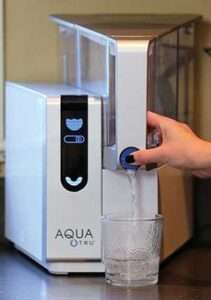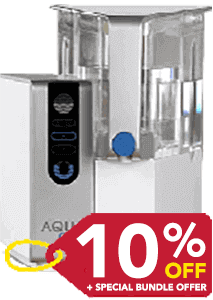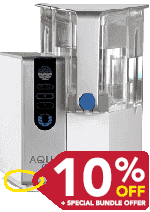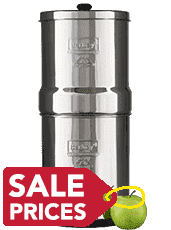Here is Why Charcoal Water Filters Will Change Your Life
Problems with Carbon Filtered Water
Here are some essential considerations before investing in carbon filtration.
Perhaps the biggest problem with using activated charcoal is the amount of time it takes to filter water. One of the most popular carbon filter water bottles is from Black + Blum and it takes a minimum of 1 hour to work at all, and 8 hours for optimum results.
Carbon filters can harbor bacteria. This is according to NSF International. This happens if the charcoal is not replaced often enough and will lead to a build up of bacteria on the surface of the carbon. This could also be the case if you leave the carbon lying around in the open for a long period of time or carelessly store it in a place where it can come in contact with potential contaminants and germs.
Contaminated replacement charcoal. You should remember that not all carbon filter replacements are created equal. Due to the popularity of this method of water filtration, many non-certified charcoal filter stick retailers have sprung up.
If you inadvertently use a poor quality replacement, it will not be as effective as a high-quality one, and could even introduce contamination and affect your water quality. Always buy replacement charcoal from a trusted supplier, i.e. one with necessary certification.
Charcoal Water Filters: Are There Side Effects?
People don’t often have problems with water derived from charcoal filters. This is because it produces some of the cleanest, mineral-rich water possible.
However, a quick review of numerous online forums shows that some people have experienced adverse side effects, like charcoal filtered water leaving them with a metallic taste in their mouth and a metallic, tingling sensation on their lips. This isn’t necessarily alarming, but it’s certainly worth noting.
4 Charcoal Water Side Effects
Here are some side effects that you might want to be aware of as you decide whether this type of house water filtration system is right for you:
Be careful if you’re using medicines – research shows when sorbitol is combined with activated charcoal, it can have negative side effects like electrolyte abnormalities, hypernatremia, dehydration, hypermagnesemia, and shock.
Ocular – You should avoid charcoal coming into direct contact with your eyes. If it does, immediately rinse your eyes with clean water. In extreme cases, activated charcoal can cause corneal abrasions. If you ever find yourself in this situation, seek immediate professional medical advice.
Using activated carbon for gastrointestinal problems Many people swear by using activated charcoal to ease gastrointestinal issues with great effect. However, this can lead to some side effects for some. Potential side effects include vomiting and nausea. Also, be careful about overdosing, as ingesting too much activated charcoal can result in bowel obstruction and perforation of your gastrointestinal tract. Other possible side effects include dark coloured stools and chalk-like taste on the tongue.
Also note that the issues mentioned above represent both extreme and rare cases. These will almost certainly affect only a small percentage of individuals, and in many cases are the result of allergic reactions. However, this is unlikely to be an issue for most people.
What Does Activated Charcoal Do To Water?
Charcoal can come from wood, coal, petroleum and other substances. Now, this doesn’t mean you can load up your glass bottles with loads of just any charcoal. On its own, simply dumping a load of charcoal in your water will do absolutely nothing for your water purity. In fact, doing that would probably do the opposite and leave you with poorer-quality water than before.
Charcoal becomes “activated” when exposed to a combination of high temperatures and a gas or other activating agent, which expands its surface area. Activated charcoal is the type of charcoal you need to filter water.
As disgusting as it might sound, adding a stick of activated charcoal, a.k.a binchotan charcoal to your water can remove impurities, and improve the taste and quality of water.
There are also potential health benefits to adding these activated charcoal sticks to your water.
It is very popular in Japan and fans of the practice say the portable charcoal sticks are the most effective tool for filtering water impurities.
Charcoal Water Filter Bottle
If you’ve never seen charcoal in its raw state, you’re not alone. Especially since most filter bottles that use charcoal hide it.
However there are new brands emerging everyday that don’t hide the source of their power (so to speak) and instead put the charcoal’s filtering capabilities on display.
Take the Black + Blum Charcoal Filter Water Bottle (shown in the picture), for example.
Another advantage to using activated charcoal over other types of water filters is their lifespan. They can last for up to six months when used daily.
Charcoal Water Filter Stick: How Does it Work?
The activated charcoal stick responsible for purifying water, binchotan charcoal, comes from tree branches.
Once activated, it absorbs impurities like chlorine by attracting the negative ions to its surface.
Activated charcoal also add things like magnesium, iron, and calcium to the water, which enhances its health benefits while also, according to many who’ve tried it, improving the taste. Some people claim it tastes even better than flat water.
100% filtered water has had everything removed from it, including nutrients and minerals, which contributes to a flat taste.
However, activated charcoal improves the taste and adds natural minerals and beneficial nutrients.
Additionally, activated charcoal effectively neutralises the water’s pH level.
Charcoal Water Filter Cartridge / Charcoal Water Filter for Water Bottles
There is no filter cartridge because the water is directly filtered by the activated carbon you put in the water. Each stick can cost as little as $10 / £4.50 and lasts for 6 months if used daily.
Charcoal (or Activated Carbon) Water Filter Japanese?
This method of filtering water originated in Japan and has been used there for well over 500 years. The name “Binchotan” is also of Japanese origin.
Charcoal Water Filter Pitcher?
Many people are confused by the term “water filter pitcher.” A “pitcher” basically means “container” or “jug.” So a “carbon water filter pitcher” is simply a container for holding and pouring water that contains a carbon filter.
Charcoal Water Filtration System
You can even use activated carbon to filter large amounts of water, and, perhaps, install some kind of system into your home tap or main water supply. However, it would not be very cost effective or efficient. Especially when compared to having something like a reverse osmosis system installed in your home.
Plus…
Using charcoal as a water filter system could also be quite messy, as they need to be changed and replaced every couple of months.
Charcoal Water Filter Benefits
The biggest benefit of using activated charcoal is the cleaner, purified, and better tasting water you get at the end of the process. This is useful because water can very easily contain contaminants like chlorine, heavy metals, bacteria, and more.
Activated charcoal or carbon filters can be used in refrigerator water filter jugs or portable water filters and used in your garden for bio-char.
It interacts with water to add nutrients to it. Charcoal when activated can add healthy things like calcium, magnesium and iron back into your drinking water.
How Will Charcoal Water Filters Change Your Life?
 Carbon filtering is a method of water filtration that uses activated carbon to remove impurities and contaminants from water.
Carbon filtering is a method of water filtration that uses activated carbon to remove impurities and contaminants from water.
The active charcoal stick responsible for this is called binchotan charcoal and it comes from tree branches. Once activated it works by absorbing impurities like chlorine by attracting the negative ions to its surface.
Here are 3 tangible reasons why I think this form of water filtration is AWESOME.
![]()
 The clever thing is that it does not just filter water. Simple water filters can sometimes remove helpful nutrients and minerals thereby making the water taste flat. Activated charcoal filters, on the other hand, also add magnesium, iron and calcium back into the water so that water tastes nice and is healthy.
The clever thing is that it does not just filter water. Simple water filters can sometimes remove helpful nutrients and minerals thereby making the water taste flat. Activated charcoal filters, on the other hand, also add magnesium, iron and calcium back into the water so that water tastes nice and is healthy.
![]() You only need to replace the carbon filter once every 6 months (if used daily).
You only need to replace the carbon filter once every 6 months (if used daily).
![]()
 It is easy to find and buy a carbon or charcoal water filter. You can even buy charcoal water filter bottles for as little as £15-20 and a charcoal filter for much less.
It is easy to find and buy a carbon or charcoal water filter. You can even buy charcoal water filter bottles for as little as £15-20 and a charcoal filter for much less.
The Best Way To Filter Your Water At Home?
The good news is that you can count on ALL of these brands mentioned in this post to provide you with water that is cleaner through activated charcoal and tastier than tap water.
If you are outside of the US there are many similar brands that offer similar charcoal products.
However, there are many other carbon-based filters that help you drink tap water safely.
My personal favorite solution is from AquaTru. Yes yes I know it’s not technically a charcoal filter but it’s reverse osmosis plus.
By that I mean it is based on reverse osmosis but with smaller more precise filters.
The machine has certifications by NSF to 58 & 372 standards. It even has its very own smart TDS monitoring panel. TDS stands for total dissolved solids and means all the actual bits and pieces in tap water.
 The tankless design is more compact and easier to install than regular reverse osmosis.
The tankless design is more compact and easier to install than regular reverse osmosis.
Finally this machine comes with a smart faucet and a “Worry-Free Guarantee”.
AquaTru Water Filter | Berkey Water Filter |
 |  |
| - Arsenic: Approx 90% (unspecified). - Fluoride by 91.8% (WITHOUT extra filters). - Lead 97.5% - Benzene 99.9% - Chlorine 96.6% - Cysts 99.99% | - Arsenic by 99.9% (special filters required). - Fluoride by 99.9% (special filters required). - Lead 97.5% - Benzene 99.8% |
| Available in 1-size only. | Available in various sizes. |
| Plastic materials. | Metal & plastic materials. |
| Number of filters: 3 | Number of filters: 2 - 4 |
| Filter methods: Mechanical, Reverse Osmosis & Activated Carbon filters. | Filter methods: Black microporous-filters & white fluoride Filters |
| 4-stage filter process. | 2-stage filter process. |
| Holds a maximum water capacity of 3-quarts. | 2.25 Gallons |
| 45.7 x 45.7 x 38.1 cm | 19" High x 8.5" Diameter |
| System: 1 year limited warranty. | Filters: 2 years; System: 1 year. |
| Full Performance Data Sheet (AquaTru). | Berkey Contaminants List NSF/ANSI test results |
| SPECIAL OFFER? Yes, use code MRWATERGEEK  | SPECIAL OFFER? Yes, Big Berkey bundle sale |
 | |




